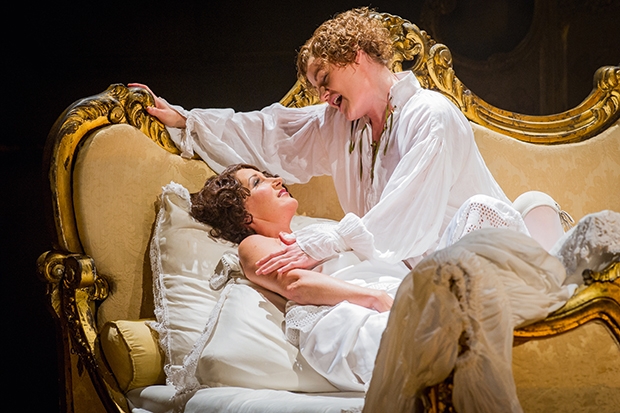Shiny swags of gold cloth hang in front of the curtain before David McVicar’s production of Der Rosenkavalier, and that’s good. You want a touch of luxury in a Rosenkavalier. This is 20th-century opera’s great sinful, indulgent treat. Think of it and you think of Karajan and Schwarzkopf: huge creamy voices, silken Viennese strings, and New York Met production budgets.
In truth, when Der Rosenkavalier gets under your skin, none of that matters. It’s not the glittering set pieces that turn out to be the real heart of the thing; not even the final Trio or the justly famous sequences in which the Marschallin ponders the transience of youth. They’re all essential, of course — the drama’s whole driving force is the tension between outward show and private reality. But what sticks with you are sudden, evanescent moments: a key change, a woodwind chord, the way two characters brush hands or meet each other’s eye. Almost unprecedentedly in the history of the art form, Richard Strauss and his co-creator Hugo von Hofmannsthal invented this story and these characters with the sole intention of letting music give them life. ‘Profundity must be hidden,’ said Hofmannsthal. ‘Where? On the surface.’ At its best, Der Rosenkavalier evokes the fleeting, piercing sweetness of life as it’s lived with an immediacy that’s unmatched in any other opera.
Which is a long way of saying that Der Rosenkavalier’s ripeness needs to be bruised slightly if it’s to release its full flavour. McVicar’s well-worn 1999 production is a good starting point. Traditional in style, it’s previously been seen at both Scottish Opera and ENO, where it looked too small for the Coliseum. Leeds Grand Theatre suits it much better; the russets, greens and golds glow like one of the Hogarths that were Hofmannsthal’s inspiration, and the individual performances come across vividly. McVicar makes all the big moments work. The Marschallin’s chaotic morning levée in Act One is clearly laid out, and Octavian’s grand entry in silver armour for Act Two’s presentation scene is as dazzling to the eye as Strauss’s score is to the ear.
From that base, revival director Elaine Tyler-Hall has roughed the show up a bit; and again, that’s all to the good. The comedy can be broad. Baron Ochs’s wordless servant Leopold (Mark Burghagen) carries on like a randy Jack Russell, though in Henry Waddington’s performance Ochs, usually the worst offender for Germanic buffoonery, cuts a remarkably aristocratic — even elegant — figure. As Sophie, Fflur Wyn seemed to vanish inside her wedding dress. Eyes pleading and shoulders drooping, she became a touching if slightly unexpected focus for the final scenes — wilting with confusion and distress, then lighting up with a joy that all too clearly contained a large measure of relief. With Ylva Kihlberg’s peppery, impetuous Marschallin and Helen Sherman’s ardent but flustered Octavian, this was no easy tying-up of loose ends, and in a Rosenkavalier that was simultaneously more bitter and more sweet than many, tipped the scale towards tears.
Worth seeing? Certainly. Worth hearing? That’s trickier. The fact that none of these singers sounded as if their voices entirely suited the roles (Wyn’s crystal-bright soprano and Waddington’s light but handsome baritone worked best) could be excused on the strength of their characterisation. Aleksandar Markovic’s coarse, noisy conducting was harder to ignore. Obliterating the singers with a wall of orchestral sound at the climax of the Trio is one thing; but when a floated low note in the Marschallin’s Act One monologue is drowned by a solo bass clarinet, something’s badly wrong. This is Markovic’s first production as Opera North’s new music director, and all reasonable opera-lovers will want him to succeed. His conducting has an exciting sweep, and he kept Act Three’s pantomime antics spinning weightlessly along. But having heard his ear-splitting Jenufa last season, I can’t pretend there isn’t an issue here; hopefully one that can be promptly addressed.
It’d be easy, too, to dismiss ENO’s Tosca as a vocally miscast off-the-peg revival. But try to ignore the unhelpful lighting of Catherine Malfitano’s 2010 production, and the way the setting shifts from a basically naturalistic Rome in Acts One and Two to what appears to be the Death Star in Act Three. Focus on Gwyn Hughes Jones’s belting high notes as Cavaradossi rather than his choppy phrasing, and the rat-like malevolence of Craig Colclough’s Scarpia instead of an underpowered voice that lurches breathily between different registers. And most importantly, enjoy Keri Alkema’s vulnerable, almost girlish Tosca; the poise and luminosity of her singing, and the way conductor Oleg Caetani and an on form ENO orchestra support it in warm, flexible phrases without any loss of colour or expression. ENO needs hits, and Caetani and Alkema make this Tosca worthwhile. Meanwhile, someone should give Markovic Caetani’s number.






Comments